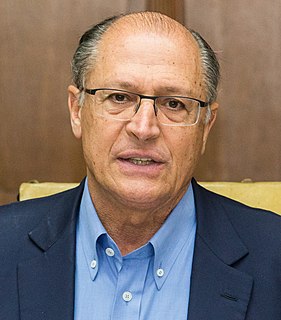
Diretas Já was a civil unrest movement which, in 1984, demanded direct presidential elections in Brazil.

José Serra is a Brazilian politician who has served as a Congressman, Senator, Minister of Planning, Minister of Health, Mayor of São Paulo, Governor of São Paulo state, and Minister of Foreign Affairs of Brazil.
Folha de S.Paulo, also known as Folha de São Paulo, or simply Folha, is a Brazilian daily newspaper founded in 1921 under the name Folha da Noite and published in São Paulo by the Folha da Manhã company.

Geraldo José Rodrigues de Alckmin Filho is a Brazilian politician who served as the Governor of São Paulo from 2001 to 2006, and then again from 2011 to 2018. He was the Brazilian Social Democracy Party (PSDB) presidential nominee for the 2018 presidential election. He is usually described by political analysts and supporters as a pro-business centrist, closely associated with the political and financial establishment.

Lygia Fagundes Telles is an award-winning Brazilian novelist and short-story writer. Educated as a lawyer, she began publishing soon after she completed high school and simultaneously worked as a Solicitor and writer throughout most of her career. She is a recipient of the Camões Prize, the highest literary award of the Portuguese language and her works have received honors and awards from Brazil, Chile and France. She was elected as the third woman in the Brazilian Academy of Letters in 1985 and holds Chair 16.

Mário Covas Almeida Júnior was a Brazilian politician.

José Ribamar Ferreira, known by his pen name Ferreira Gullar, was a Brazilian poet, playwright, essayist, art critic, and television writer. In 1959, he was instrumental in the formation of the Neo-Concrete Movement.

Dilma Vana Rousseff is a Brazilian economist and politician who served as the 36th President of Brazil, holding the position from 2011 until her impeachment and removal from office on 31 August 2016. She was the first woman to hold the Brazilian presidency and had previously served as Chief of Staff to former president Luiz Inácio Lula da Silva from 2005 to 2010.

Larissa Costa Silva de Oliveira, commonly known as Larissa Costa, is a Brazilian beauty queen who won the Miss Brasil 2009. Larissa Costa represented Brazil in the Miss Universe 2009.

Fernando Haddad is a Brazilian academic and politician who served as Mayor of São Paulo from 2013 to 2017. He was the Workers' Party candidate for President of Brazil in the 2018 election, replacing former President Luiz Inácio Lula da Silva, whose candidacy was barred by the Superior Electoral Court under the Clean Slate law. Haddad faced Jair Bolsonaro in the run-off of the election, and lost the election with 44.87% of the votes against the 55.13% of Bolsonaro.

General elections were held in Brazil on 5 October 2014 to elect the President, the National Congress, state governors and state legislatures. As no candidate in the presidential and several gubernatorial elections received more than 50% of the vote, a second-round runoff was held on 26 October.

The Brazilian presidential election was held in 1974, through a electoral college system with two parties. It was the 22nd Brazilian presidential election, and the 4th from the Brazilian military government.

Indirect presidential elections were held in Brazil on 25 October 1969. The elections were the third held under the Brazilian military government, and used an electoral college system.

Events in the year 1947 in Brazil.

Events of the year 1968 in Brazil

General elections were held in Brazil on 7 October 2018 to elect the President, Vice President and the National Congress. Elections for state governors and vice governors, state legislative assemblies and the Legislative Chamber of the Federal District were held at the same time.

João Agripino da Costa Doria Júnior is a Brazilian politician, businessman and journalist who is the 37th and current Governor of São Paulo, in office since January 2019. He previously served as the 52nd Mayor of São Paulo from 1 January 2017 to his resignation on 6 April 2018. He was the first mayor in 24 years to be elected in the first round. Doria is a member of the Brazilian Social Democracy Party (PSDB), and is known for having hosted the TV show O Aprendiz, a Brazilian version of The Apprentice. Doria resigned the office of mayor in April 2018 in order to run for Governor of São Paulo.

Angela Maria, the stage name of Abelim Maria da Cunha, was a Brazilian singer and actress. She was elected "Queen of the Radio" in 1954 and was considered the most popular singer of that decade in Brazil.

The presidency of Jair Bolsonaro started on 1 January 2019. Jair Bolsonaro was elected the 38th president of Brazil on 28 October 2018 by obtaining 55.1% of the valid votes in the 2018 Brazilian general election, defeating Fernando Haddad.





















